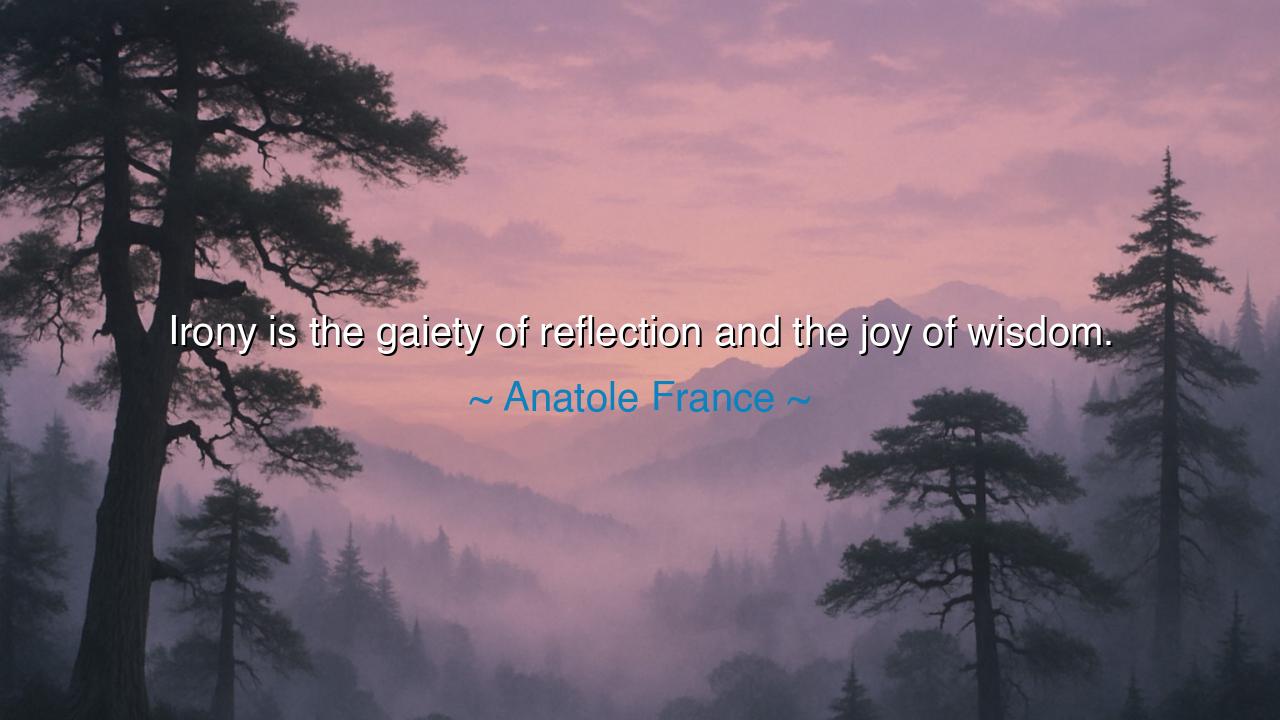
Irony is the gaiety of reflection and the joy of wisdom.






Anatole France, sharp of wit and gentle in spirit, once proclaimed: “Irony is the gaiety of reflection and the joy of wisdom.” In these words he reveals that irony is not merely mockery nor cruelty of tongue, but the laughter of the thoughtful, the smile of one who has seen deeply into life’s illusions. It is born not of malice, but of reflection—the capacity to step back, to see folly in its nakedness, and to answer it not with despair but with mirth.
To the unthinking, life’s contradictions bring only frustration. To the wise, however, these contradictions are cause for wonder and for gentle laughter. For what else is wisdom but the ability to see both the heights and the absurdities of human striving, to know that kings and beggars alike are bound by the same fate, and yet to find in this knowledge not sorrow but a strange joy? Thus Anatole France teaches that irony is not cynicism, but the soul’s way of embracing truth without bitterness.
History offers us luminous examples. Consider Socrates, who wielded irony like a sword sheathed in humor. By pretending ignorance, he exposed the ignorance of others; by asking simple questions, he revealed profound truths. His gentle mockery was not to humiliate, but to awaken. The Athenians condemned him, yet his irony became eternal, a model of how reflection and wisdom can turn even folly into joy.
So too, the letters of Voltaire sparkle with this same spirit. Against tyranny, fanaticism, and hypocrisy, he raised not only argument but laughter. His irony unmasked pretension and broke chains, reminding the world that the pen, sharpened with humor, can be mightier than the sword. Here, irony was not bitterness, but a celebration of truth, a way of bearing the burdens of the world with gaiety rather than despair.
O children of tomorrow, remember this teaching: when you see folly, do not drown in anger, nor wallow in sorrow. Learn instead the noble art of irony, which is the laughter of reflection and the radiant joy of wisdom. For to laugh wisely is to triumph over falsehood without becoming false oneself. Let irony be not a dagger of scorn, but a lamp of delight, guiding you to hold truth lightly yet reverently, and to walk through life with both gravity and mirth.






Ttouyen
I feel both enlightened and amused reading this quote. It portrays irony not as cynicism, but as a joyful recognition of life’s contradictions. Does this mean that wise individuals naturally see the humor in the human condition? I also wonder whether the capacity for irony is a form of emotional and cognitive flexibility, allowing people to navigate complexity with grace. Could developing this skill contribute to a richer, more reflective life?
VNvy Nguyen
This statement makes me question how often we miss the subtle joys of contemplation. Can irony serve as a bridge between understanding and amusement, turning serious reflection into a source of delight? I wonder whether people who fail to appreciate irony may also miss nuances in social behavior or philosophical insight. Could cultivating a sense of ironic humor enhance both emotional intelligence and intellectual depth?
LQLam Quynh
I find this thought both playful and profound. It suggests that reflection can be joyful rather than burdensome. Does this imply that wisdom need not be solemn or heavy, but can be experienced with lightness and amusement? I’m curious whether irony helps people see contradictions in their own behavior or in the world, making wisdom more accessible and engaging. Could this be why literature and satire often use irony to teach important lessons?
TPThao Phuong
Reading this, I feel intrigued by the idea that irony is a form of intellectual pleasure. Does this mean that those who can recognize and enjoy irony have a unique perspective on human nature and society? I also wonder whether irony functions as a tool to question assumptions and reveal hidden absurdities. Could embracing irony make us more resilient, perceptive, and thoughtful in our approach to life’s challenges?
LLong
This quote makes me wonder about the relationship between humor and insight. Is irony a way of coping with life’s contradictions, or does it reveal deeper truths that straightforward thinking might miss? I’m curious whether people who appreciate irony naturally possess a heightened sense of reflection and wisdom, or if the ability to see irony can be cultivated. Could this suggest that laughter and intellect are more intertwined than we often realize?